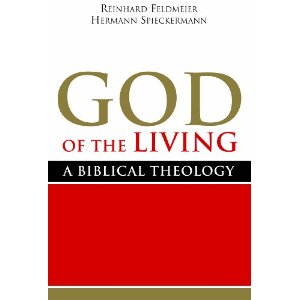Let’s start the New Year off with a bang—- an extended review and critique of one of the most important books written on Biblical Theology in many years. Reinhard Feldmeier and Hermann Spieckerman have produced a $60, 620 pages salvo of monumental proportions which has already been favorably reviewed at the SBL by several major scholars. At the end of this series of posts, I will post several of their briefer reviews, so you can hear other voices chiming in other than mine. Needless to say, they think this is a major work. I do too. What makes it a almost unique work is that it is done by one OT and one NT scholar who are more than competent in the field of Biblical Studies, and indeed who are Christian believers trying to make sense of the Biblical text when it comes to theology. Hooray! I applaud their efforts.
Let us start with a general comment. This book is not easy reading. If you were hoping for ‘theology for dummies’ this is not it. In particular the English translation of the work is quite literal, and this in turn means it often has the feel of long Germanic sentences, with many clauses and qualifications. I personally was not thrilled by this because I want more people to read and benefit from this work. This was a judgment call of my good friend Carey Newman (who has published five of my own books) and I understand why he did it. I suggested a second more readable edition down the road, and he seemed amenable to that suggestion. Here is a second caveat about the book. It does not have much meaningful interaction with English speaking scholarship dealing precisely with the subject of Biblical theology. Hopefully this too will be remedied down the road in a second edition, or perhaps a student edition. Bearing these two things in mind, let us turn to the review.
In this post I will deal with exactly one page— the Introduction page (p. 1). Sometime book titles are not very revealing of the content or focus of a book, but this is not one of them. The authors believe that the focus of Biblical theology should be on the doctrine of God, and not just any God, but the ‘God of the Living’. 2) the title of course comes from Mark 12, the famous story about the Sadducees questioning Jesus about the resurrection. More specifically it comes from Jesus’ rebuttal “He is not the God of the dead, but of the living”, referring to the fact that Abraham, Isaac, and Jacob are very much alive at the time he was speaking.
The authors say that Jesus was responding to those who did not think resurrection was Scriptural by “an interpretation of Scripture determined by his own experience of God, an interpretation that unites God as Creator with God as Savior from an eschatological perspective as God of the Living.”(p. 1). The very nature of God is that God is the life giver, which they further define not just in terms of physical existence but as “life freed from guilt, life not unto death, but life from God and unto God, [which involves] assured participation in his life”.
In short, God’s saving activity defines or reveals God’s character and nature, such that the doctrine of God is primarily about his character, not merely his abilities or attributes. What kind of personal being is God? Since it is God who brings life to life in the first place, this necessarily relativizes all human attempts to define the meaning of life, or human attempts to say what truly counts as life. “The divine gift of liberated life is liberation from any pressure to discover the meaning of one’s own life and ethic in order to give life a foundation and a norm.” So much for Kant’s efforts in that direction. Thus part of what it means to have a relationship with ‘the God of the living’ is a confidence, as Jesus himself showed about the patriarchs, that “God will maintain this bond even in death. In this qualified sense, biblical theology in the form of the doctrine of God is ‘life science’.” In short, no one is more pro-life or pro-lific than our God. More in many more subsequent posts.












